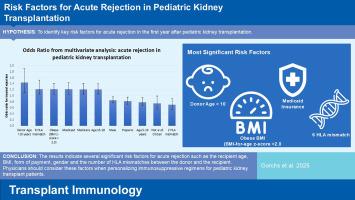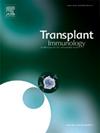儿童肾移植急性排斥反应的危险因素。
IF 1.4
4区 医学
Q4 IMMUNOLOGY
引用次数: 0
摘要
背景:儿童肾移植患者的急性排斥反应会增加移植后的费用并导致移植物的有限存活。确定儿童肾受体急性排斥反应的关键危险因素可以使医生更好地定制免疫抑制方案,减少急性排斥反应的发生。方法:利用联合器官共享网络(UNOS)提供的肾移植数据,对2005年1月至2022年12月期间接受首次肾移植的18岁以下 患者进行回顾性分析。最终的研究人群包括10126名患者,时间跨度为18年。使用多变量分析确定移植后第一年急性排斥反应的危险因素。结果:发现几个变量是急性排斥反应的有统计学意义的危险因素,包括供体年龄 ≤ 10(比值比1.44)、肥胖BMI (BMI-for-age z-score > 2.0)(比值比1.22)、6人白细胞抗原(HLA)不匹配(比值比1.22)和受体年龄在15 - 18岁之间(比值比1.21)。发现多重因素具有保护作用,包括男性(优势比0.85)和受体年龄在5至10岁之间(优势比0.79)。结论:受者年龄、体质指数、性别、供者与受者HLA错配次数等因素均有明显危险。医生在为儿童肾移植患者个性化免疫抑制方案时应考虑这些因素。本文章由计算机程序翻译,如有差异,请以英文原文为准。

Risk factors for acute rejection in pediatric kidney transplantation
Background
Acute rejection in pediatric kidney transplant patients can increase posttransplant costs and lead to limited survival of the graft. Identifying key risk factors for acute rejection in pediatric kidney recipients may allow for physicians to better tailor immunosuppressant regimens and decrease the occurrence of acute rejection.
Methods
A retrospective analysis was performed using kidney transplantation data provided by the United Network for Organ Sharing (UNOS) for patients younger than 18 years old who received their first kidney transplant between January 2005 and December 2022. The resulting study population consisted of 10,126 patients over the 18-year span. Risk factors for acute rejection in the first year post-transplant were identified using a multivariate analysis.
Results
Several variables were found to be statistically significant risk factors for acute rejection, including donor age ≤ 10 (Odds Ratio 1.44), Obese BMI (BMI-for-age z-score > 2.0), (Odds Ratio 1.22), a 6 Human Leukocyte Antigen (HLA) mismatch (Odds Ratio 1.22) and recipient age between 15 and 18 (Odds Ratio 1.21). Multiple factors were found to be protective, including male sex (Odds Ratio 0.85) and recipient age between 5 and 10 (Odds Ratio 0.79).
Conclusions
The results indicate several significant risk factors such as the recipient age, Body Mass Index, sex and the number of HLA mismatches between the donor and the recipient. Physicians should consider these factors when personalizing immunosuppressive regimens for pediatric kidney transplant patients.
求助全文
通过发布文献求助,成功后即可免费获取论文全文。
去求助
来源期刊

Transplant immunology
医学-免疫学
CiteScore
2.10
自引率
13.30%
发文量
198
审稿时长
48 days
期刊介绍:
Transplant Immunology will publish up-to-date information on all aspects of the broad field it encompasses. The journal will be directed at (basic) scientists, tissue typers, transplant physicians and surgeons, and research and data on all immunological aspects of organ-, tissue- and (haematopoietic) stem cell transplantation are of potential interest to the readers of Transplant Immunology. Original papers, Review articles and Hypotheses will be considered for publication and submitted manuscripts will be rapidly peer-reviewed and published. They will be judged on the basis of scientific merit, originality, timeliness and quality.
 求助内容:
求助内容: 应助结果提醒方式:
应助结果提醒方式:


